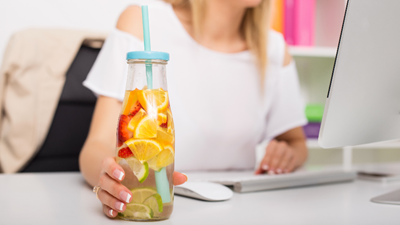Our bodies need water to survive. Water doesn’t just keep us from feeling thirsty, it is instrumental in helping our bodies run efficiently. Water makes up 55 percent to 65 percent of adult bodies and about 78 percent of newborn bodies. Within the body, the brain and heart contain 73 percent water, muscles and kidneys contain 79 percent and even our bones are made up of 31 percent water.
Water helps cells grow and reproduce, and the brain make hormones and neurotransmitters. It also regulates body temperature through sweating and breathing, flushes body waste through urine and helps with digestion.
Not taking in enough water can lead to dehydration, which can range from mild to severe. The Institute of Medicine recommends that on average, men should get 91 ounces of total water (from water, other beverages and foods) each day, and women should get 125 ounces.
Dehydration Risks
The Centers for Disease Control and Prevention (CDC) found that most Americans do a good job of drinking water on a regular basis.
But it’s possible to become dehydrated before feeling thirsty. In addition, sometimes people are more at risk for becoming dehydrated, such as when they are busy and forget to drink, sick (especially with a prolonged fever, diarrhea or vomiting), sweating because of physical activity in hot and humid weather, don’t have access to clean drinking water or are urinating excessively as a result of diabetes or other medical condition.
The Mayo Clinic lists these signs of dehydration.
 For babies and young children:
For babies and young children:
- Dry mouth
- No tears when crying
- No wet diapers for three hours
- Listlessness or irritability
- Sunken eyes or cheeks
- Sunken soft spot on top of skull
For adults:
- Extreme thirst
- Infrequent urination or dark-colored urine
- Fatigue
- Dizziness
- Confusion
Dehydration can result in complications, including heat injury, seizures, and urinary and kidney problems.
Dehydration is treated by replacing the liquids — but that method depends on the severity of dehydration and your age and health conditions. Drinking water and other fluids may resolve dehydration, but infants and children may benefit from over-the-counter oral rehydration solutions. Water as well as sports drinks may be helpful for adults who become mildly dehydrated.
Anyone who becomes severely dehydrated should seek emergency medical treatment where they may receive salt and fluids intravenously to speed recovery.
Prevent Dehydration, Especially in Summer
Here are some ways to make sure you stay hydrated, even in the summer heat.
- Drink water as soon as you feel thirsty or hungry.
- Keep a bottle or cup of water at your desk, and refill it every few hours.
- Eat fruits and vegetables such as cantaloupe, strawberries, watermelon, grapes, oranges, lettuce, cabbage and spinach that have a high water content.
- Flavor your water with infusions of fruits or vegetables.
- Download an app to remind you to drink.
- Carry a water bottle with you in the car and sip on it at stoplights.
- Hydrate before you exercise.
- Avoid alcohol, which is dehydrating.
- Count all fluids, including juices, milk and even coffee and tea as part of your fluid intake. While juices and milk have additional calories and coffee and tea contain caffeine, they can be a good choice to augment the regular drinking of water.
- While working outdoors, drink sports drinks or fluids with electrolytes. Because you lose a lot of your salts sweating, drinking water alone will dilute electrolytes and make you feel worse.
We Build Relationships
We believe that maintaining a healthy lifestyle is the key to living a longer, healthier life. Orlando Health Physicians strive to build a relationship with each patient. Request an appointment with one of our primary care physicians with offices located throughout Central Florida.
Schedule an Appointment





